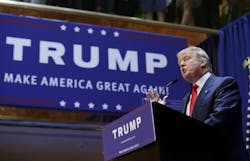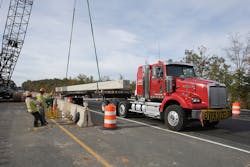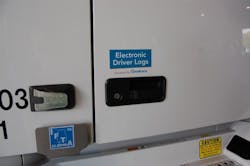The possible benefits of Trump’s focus on freight infrastructure
Bud Wright, executive director for the American Association of State Highway and Transportation Officials (AASHTO), believes that, based at least on the initial comments coming from president-elect Donald Trump, the freight industry should get some much-needed traction on its infrastructure needs.
“We were happy to see his statement [following the election results] reaffirming the need to invest in infrastructure,” Wright explained in a conference call with reporters late yesterday.
“Obviously, there will be many benefits to freight from infrastructure investment and we see that [infrastructure focus] as a sign that Trump is embracing the needs of interstate commerce,” he stressed.
While there are “no details at this point” regarding Trump’s specific infrastructure spending plans, Jim Tymon, AASHTO’s chief operating officer and director of policy and management, expressed what he dubbed “a degree of optimism” as the president-elect “continued to talk about infrastructure investments after his election,” making it a center point of his victory speech.
“Added to Republican control of the Senate and House [of Representatives] we are optimistic a solid infrastructure package can be pushed through,” Tyman noted. “We are also hopeful that within that package there will be a permanent fix for the Highway Trust Fund.”
Wright stressed, though, that he does not expect any infrastructure spending package to be part of the “first 100 day” strategic plan now being hammered out by the incoming Trump administration.
“I think that 100 day plan may be a little unrealistic and there are also many other visible things they are putting on that plate,” he pointed out. “We have the FAST Act in place for the next five years, so it’s not critical an infrastructure package gets passed in the first 100 days – but we do expect it to be part of the [legislative] conversation.”
Tyman added that one particular “speed bump” faced by any new infrastructure spending proposal will be the need for it to be either fully paid for or offset by other cuts within the federal budget.
“The economic climate is not what it was back in 2008-2009,” when then newly-elected President Obama pushed through what became known as the stimulus bill, he explained.
“In this case, any infrastructure] spending package will have to be deficit neutral,” Tyman emphasized.
Noël Perry, transportation economist at research firm FTR, added in a statement that he expects “little near-term change in the outlook for the U.S. economy” or to transportation spending levels “as budgets are set and policies are intact until later in 2017.”
There are certainly “particular risks” that arise any time there is a change in elected power, he noted, but FTR foresees limited short-term impact to the overall U.S. economy – and to the transportation industry in particular – as a result of the Trump’s victory.FTR highlighted several other transportation-related issues that could be affected by the incoming administration:
- Since the president does control foreign policy, trade agreements with the Chinese and Mexico are likely to be addressed early on in the new administration with the risk of an increase in inflation.
- Regulations and enforcement will be addressed; and if electronic logging device (ELD) implementation gets sticky because of the FMCSA’s [Federal Motor Carrier Safety Administration] slowness in publishing complete technical standards, the new administration is much more likely to postpone the ELD rule’s December 2017 deadline.
- Overall, however, FTR thinks trucking regulations in general will not be a priority for the Trump administration.
- If a major tax cut bill is in place by summer of 2017, it would likely stimulate the economy and add up to 1 percentage point in gross domestic [GDP] growth for as much as a year.
- At the same time, trade negotiations could stimulate exports and raise the cost of imports, with an accelerated inflation a likely result. That may force a significant hike in interest rates by the Federal Reserve, making recession in late 2018 or 2019 a more distinct possibility if that happens.
David Ross, managing director at the Stifel Transportation & Logistics Research Group, added in a research update yesterday that the “main issue” for the freight industry in regards to the impending Trump presidency is global trade and a threaten rise in protectionism.
“The impacts here would be from any imposition of trade tariffs or change in trade agreements that would limit the number of U.S. imports and exports – affecting ocean freight, truck, and air freight sectors,” he said in a statement. “If such policies were put in place, it would be most negative for the international forwarders, parcel carriers, and international airfreight operators.”
That being said, Ross believes infrastructure spending “would be positive for freight demand” that “would most benefit the LTL carriers” and third party logistics firms through the movement of more goods.
Yet said infrastructure spending may also worsen the truck driver shortage as well, he stressed.
“The fact that construction work often competes with trucking for the same labor [would mean] a further tightening of the driver pool, likely meaning higher [motor] carrier rates,” he said – which would be a much-needed boon to the trucking industry.
Another potential boon may be that the implementation “pace” for greenhouse gas (GHG) fuel efficiency standards may slow down, though that would also mean demand for alternatively fueled commercial vehicles may slow down, too, noted Michael Baudendistel, Stifel’s vice president and chief commercial vehicle analyst.
He explained in a statement that the final Phase 2 GHG rules for heavy duty trucks are set to go into effect on model years 2021, 2024 and 2027 vehicles. “With considerable time before those standards are set to go into effect, it is possible that they are revised,” he noted.
About the Author
Sean Kilcarr
Editor in Chief
Sean Kilcarr is a former longtime FleetOwner senior editor who wrote for the publication from 2000 to 2018. He served as editor-in-chief from 2017 to 2018.


